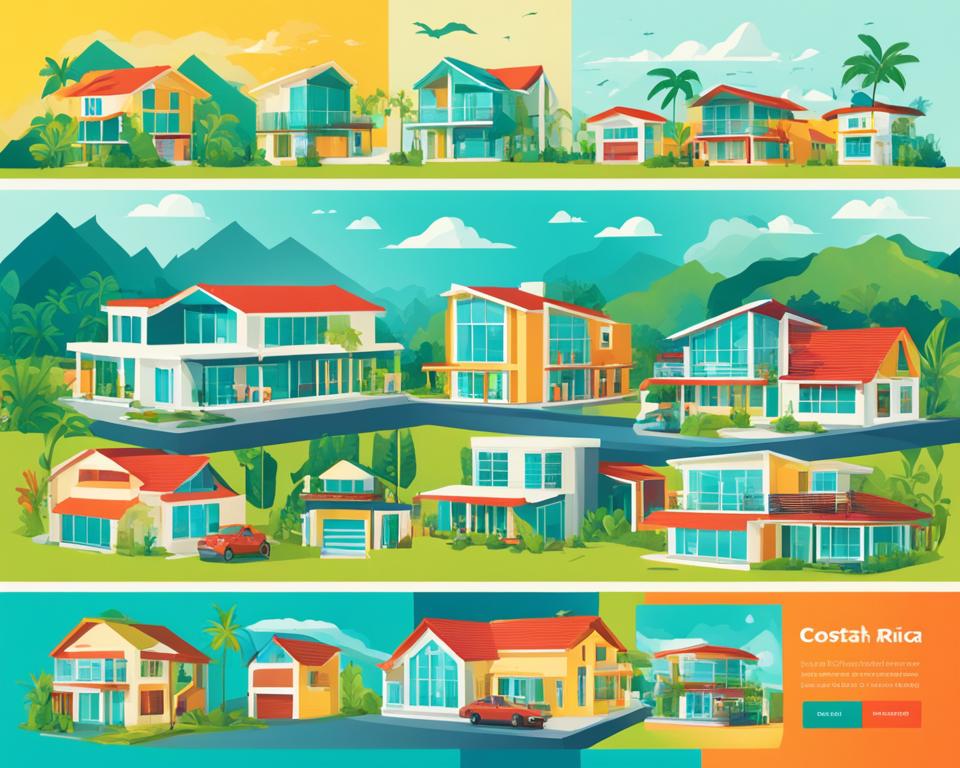Property Taxes in Costa Rica: A Comprehensive Guide
Do you know about the complex property taxes and fees in Costa Rica? If you own property or plan to invest, it’s key to understand these taxes. This guide will help you grasp the details of property taxes in Costa Rica. It aims to give you the confidence to make smart choices.
Key Takeaways
- Property taxes in Costa Rica include various fees and duties, like transfer taxes, luxury home taxes, and capital gains taxes.
- The tax rate changes with the property’s value and location, set by each town.
- Owners must update their property’s value every five years. Taxes are paid quarterly, or yearly upfront.
- Working with third parties can make paying taxes easier, especially for foreigners or those who don’t speak Spanish well.
- Not paying taxes can lead to legal trouble, showing why it’s so important to follow the rules.
Introduction to Property Taxes in Costa Rica
For foreign investors, understanding property taxes in Costa Rica is key. These taxes depend on the property’s value, location, and exemptions. Getting advice from experts and planning can help investors avoid big tax bills.
Understanding the Importance of Property Taxes
Property taxes are vital for investors and homeowners in Costa Rica. The country has different taxes like municipal tax, luxury tax, and solidarity tax. Knowing these taxes helps investors make smart financial choices and avoid tax problems.
Overview of the Costa Rican Tax System
Costa Rica’s tax system is complex, with taxes on property and transactions. It’s important for foreign investors to understand the overview of the Costa Rican tax system and property-related taxes in Costa Rica. This knowledge helps them plan their investments and follow the tax rules.
- Municipal tax: A tax levied by local municipalities on property ownership.
- Luxury tax: A tax applicable to high-value properties, typically those valued above 121 million colones (around $205,000 USD).
- Solidarity tax: A tax aimed at supporting social programs and infrastructure development.
Learning about the Costa Rican tax system helps foreign investors understand property taxes. This knowledge lets them make choices that fit their investment goals.
Property Taxes in Costa Rica
In Costa Rica, property taxes are key to the country’s tax system. They are collected every year and depend on the property’s value. The tax rate varies by location, usually between 0.25% and 1.5% of the property’s value.
Calculating property taxes in Costa Rica requires a detailed assessment by a local expert. This assessment sets the property’s value, which determines the tax. The tax bill goes straight to the owner, who must pay it by year’s end.
Costa Rica also has a “solidarity tax” for luxury properties. This tax, between 0.25% and 0.55% of the property’s value, hits homes worth ₡148,000,000 (about $250,000) or more. The tax money helps fund housing for the very poor in the country.
Property owners in Costa Rica must pay their taxes on time to avoid fines and legal trouble. Not paying taxes can lead to penalties and legal issues.

Knowing about Costa Rica’s property tax system is vital for all property owners. By keeping up with taxes, deadlines, and rules, owners can fulfill their tax duties and dodge any problems or fines.
Calculating Property Tax Obligations
Understanding how to calculate property taxes in Costa Rica is key for homeowners and investors. The tax is based on the property’s market value. This includes factors like location, size, quality of construction, and any upgrades.
Factors Influencing Property Tax Calculations
Municipal assessors in Costa Rica look at many things to figure out a property’s true value. They do this through inspections, collecting data, and analyzing it carefully. The main things they consider are:
- Property location and neighborhood
- Size and dimensions of the property
- Construction quality and materials
- Any upgrades or renovations
Property Valuation Methods
After figuring out the property’s value, the local government sets a tax rate. In Costa Rica, the basic tax rate is 0.25% of the property’s value. So, for a $100,000 property, the yearly tax would be about $250.
There might be extra taxes like garbage and parks fees, which could add around $100 a year. Also, a luxury tax might apply for properties over $214,500, with rates from 0.25% to 0.55%.
It’s vital to have accurate property assessments to make sure taxes are fair. Properties get reassessed every five years to keep taxes accurate.

Transfer Taxes Overview
In Costa Rica, transfer taxes are key in real estate deals. They affect both buyers and sellers with different tax duties. These taxes come from the government and depend on the property’s value or the deal’s amount.
Buyer’s and Seller’s Responsibilities
Buyers in Costa Rica usually pay about 1.5% of the property’s value in transfer taxes. Sellers might pay between 2.5% to 3.75% of the deal’s amount. You must pay these taxes within 30 days after signing the transfer deed. Not paying on time can result in extra fees and interest, showing why it’s vital to meet tax duties quickly.
Tax Rates for Property Transfers
Here are the specific rates for transfer taxes in Costa Rica:
- Property Transfer Tax: 1.5% of the purchase price or property tax value, if higher
- National Registry Stamp: 0.5% of the transaction value
- Stamp Duties: 5 colones per 1,000 of the contract value
These taxes add to the value-added tax (VAT) or other fees. Knowing these costs helps buyers plan better when buying property in Costa Rica.
Exemptions and Deductions
In Costa Rica, property owners can get tax breaks that lower their property taxes. These breaks are for specific uses or improvements. Owners must meet certain rules to get them.
Some properties get tax breaks if they’re for farming or are historical sites. Owners can also get deductions for making their properties better. This includes things like saving energy or helping the environment.
To get these breaks, owners need to show they’re eligible and fill out forms. It’s important to know the rules for these benefits. This way, owners can make the most of their property.
Property Tax Exemptions
- Agricultural properties: Farms and other agricultural land may be eligible for property tax exemptions.
- Historical landmarks: Properties designated as historical landmarks or cultural heritage sites may qualify for tax exemptions.
- Low-income housing: Certain low-income residential properties may be exempt from property taxes.
Property Tax Deductions
- Energy-efficient upgrades: Property owners who have made energy-efficient improvements to their homes, such as installing solar panels or energy-efficient windows, may be eligible for tax deductions.
- Environmental sustainability: Deductions may be available for property owners who have implemented eco-friendly features, like rainwater harvesting systems or green roofs.
- Disability accommodations: Modifications made to a property to accommodate individuals with disabilities may qualify for tax deductions.
Knowing about exemptions and deductions can help property owners in Costa Rica save on taxes. This makes their property investments more profitable.
Property Tax Deadlines and Penalties
It’s key to pay property taxes on time in Costa Rica to avoid big penalties. Owners must watch the deadlines, as they change by area.
If you miss these deadlines, you could face big fines or even property liens. These rules help keep the tax system fair and ensure everyone pays their share.
To keep up, property owners in Costa Rica should know the property tax deadlines. Paying on time is crucial. Not paying can lead to big financial problems, so it’s important to stay on top of your taxes.
- Learn the specific deadlines for paying property taxes in your area.
- Pay your taxes on time to dodge penalties for late payments and stay in good standing.
- Keep up with any changes in property tax deadlines and rules.
- Get expert advice if you’re unsure about your property tax duties.
By keeping an eye on property tax deadlines, Costa Rican property owners can dodge extra costs. Managing your taxes well is key for a smooth real estate journey.
Appealing Property Tax Assessments
In Costa Rica, property owners can appeal their property tax assessments if they think the valuation is wrong. They must submit a formal appeal to the local tax authority within a certain time frame. This time frame usually starts after they get the assessment notice.
Understanding Property Assessments
Property tax assessments in Costa Rica are based on the property’s registered value. This value gets updated every five years. If property owners think the assessed value is off, they might have a good reason.
They should look at factors like location, size, age, and condition. These can help spot any mistakes in the assessment.
Appealing Inaccurate Assessments
To challenge an incorrect property tax assessment, property owners need to gather evidence. This includes recent appraisals, sales records of similar properties, and other relevant info. This evidence is key to making a strong case to the tax authority.
When appealing, property owners should explain why the assessment is wrong. They should also present a solid argument for the right valuation. The tax authority will look at the appeal and evidence to see if the assessment should be changed.
Having a strong, evidence-based case can boost the chances of a successful appeal. A successful appeal can lower the property tax burden. This could mean long-term savings for the property owner.

Property Tax Reform for Foreign Investors
The recent changes in property tax laws in Costa Rica are big news for foreign investors. These changes make it easier for them to invest in real estate. They offer lower tax rates and simpler rules.
These updates could mean better investment chances, more money from their investments, and a stronger position in the global market. But, understanding the new tax laws and following the rules can be tricky for those new to Costa Rica’s real estate scene.
To make the most of the new property tax reforms in Costa, foreign investors need to keep up with the changes. They should look for ways to pay less tax while still following the law.
Advantages of the New Tax Regulations
- Reduced tax rates for foreign investors
- Streamlined property tax calculation and payment processes
- Increased investment opportunities and potential for higher returns
- Enhanced competitiveness in the global real estate market
Navigating Compliance Challenges
The new tax reforms in Costa Rica are good for foreign investors but bring new rules to follow. Investors might find it hard to understand the complex tax laws, meet the new requirements, and handle risks from tax changes.
These tax law changes also affect how investors plan their real estate moves. They need to check their investments, look for new chances, and adjust to the changing tax rules.
Seeking Professional Guidance
Foreign investors should get help from local real estate experts and tax pros to deal with the new tax rules in Costa Rica. These experts can offer key advice on the reforms, help with tax planning, and make sure they follow the law.
Strategies to Minimize Property Taxes
Property owners in Costa Rica can use smart strategies to lower their property taxes. One key tip is to use tax deductions by keeping track of all property-related costs. This includes upkeep, improvements, and mortgage interest. Making sure your property is assessed correctly can also help avoid paying too much in taxes.
Working with a skilled real estate attorney can be very helpful. They can guide you on how to legally lower your taxes in Costa Rica. This partnership makes understanding complex tax laws easier.
- Maximize tax deductions by carefully tracking and documenting property-related expenses.
- Ensure accurate property assessments to prevent overvaluation and excessive taxation.
- Consult with a knowledgeable real estate attorney to explore legal tax minimization strategies.
Using these strategies can help property owners in Costa Rica cut their taxes and improve their finances. Getting property assessments right is crucial because it affects how much tax you pay. Being proactive and informed about property taxes can save you a lot of money over time.
Legal Requirements and Compliance
It’s crucial for property owners and investors in Costa Rica to follow the law to avoid legal trouble and fines. Knowing the tax laws about owning property in Costa Rica is key. If you don’t follow the rules, you could face big financial losses.
Types of Costa Rican Taxes
Property owners need to learn about different taxes like property transfer taxes, annual property taxes, and capital gains taxes. Costa Rica has a complex tax system with various types, including income tax, corporate tax, municipal tax, and value-added tax. Each type has its own rules and laws.
Penalties for Non-Compliance
Getting a real estate lawyer’s help is a smart move to handle taxes and follow the law. They can protect your investment and prevent tax problems. If you don’t file declarations or pay taxes on time, you could face big fines and penalties in Costa Rica.
It’s important to know the consequences of not following the law. This helps property owners stay in good standing and avoid expensive legal troubles.
To follow Costa Rican tax laws, it’s best to get advice from a real estate lawyer or tax. They can guide you through the complex tax system and help you meet your legal duties.
Property Taxes in Costa Rica
Property taxes in Costa Rica are quite favorable compared to other countries. The annual rate is usually between 0.25% and 1.5% of the property’s value. This is often lower than what you’d pay in the United States or Canada. Owners must update their property’s value every five years to avoid penalties and keep taxes accurate.
There’s also a transfer tax on real estate deals in Costa Rica, which can be 1% to 5% of the deal’s value. It’s important for both locals and foreign investors to know about taxes, deadlines, and rules. This helps them manage their property finances well in the country.
Key Tax Considerations for Property Owners
- The annual property tax rate in Costa Rica varies between 0.25% and 0.55% based on the declared property value.
- Luxury properties with a construction value exceeding $230,000 are subject to an additional luxury tax ranging from 0.25% to 0.55%.
- Inactive corporations in Costa Rica must pay a fixed annual fee of $120, while active corporations pay between $120 and $380 depending on their income.
- Property owners in Costa Rica must also pay a garbage collection fee, which varies based on the property’s location and type of use (residential or commercial).
- Taxpayers in Costa Rica can choose to pay their property taxes and garbage collection fees either annually in advance or quarterly.
It’s key for both locals and foreign investors to understand Costa Rica’s property taxes. Knowing the rules and using exemptions and deductions can help manage taxes better. This way, property owners can keep their finances in check in the country.
Conclusion
Understanding property taxes in Costa Rica can be complex. Yet, by knowing the tax rules and using smart strategies, real estate owners can lessen their tax load. It’s key for owners to understand local tax laws and use all deductions they can.
Important steps include checking tax assessments often, keeping up with tax law changes, and appealing assessments if needed. Proactive tax planning, like making payments over time or looking into exemptions, helps manage property tax expenses. By being proactive and informed, owners can better handle Costa Rica’s tax system and save money.
To learn more about importance of tax planning for property owners, owners can look into resources for further information. This includes talking to local tax experts or using trusted online sources. By staying informed and proactive, owners can tackle the tax system’s challenges and get the most from their real estate.
FAQ
What are the property taxes in Costa Rica?
How are property taxes calculated in Costa Rica?
What are the transfer taxes when buying or selling property in Costa Rica?
Are there any tax exemptions or deductions available for property owners in Costa Rica?
What are the deadlines and penalties for paying property taxes in Costa Rica?
Can property owners appeal their tax assessments in Costa Rica?
How has the recent property tax reform in Costa Rica affected foreign investors?
What strategies can property owners use to minimize their property taxes in Costa Rica?
What are the legal requirements for property owners in Costa Rica?
Source Links
- https://livingcostarica.com/costa-rica-real-estate-topics/faq-property-tax-and-other-taxes-to-pay-when-buying-property-in-costa-rica/
- https://blog.nativu.com/en/municipal-taxes-costa-rica/
- https://www.coldwellbankersamara.com/article/comprehensive-guide-to-property-taxes-in-costa-rica
- https://www.godutchrealty.blog/costa-rica-taxes/all-about-costa-rica-property-tax/
- https://osatropicalproperties.com/blog/tax-implications-for-expats-owning-property-in-costa-rica
- https://www.specialplacesofcostarica.com/property-management/costa-rica-taxes/
- https://rebeccaclower.com/costa-rica-living/costa-rica-taxes-101-property-import-income-vat-taxes
- https://bluewaterpropertiesofcostarica.com/blog/costa-rica-property-tax-calculate-municipal-luxury-tax/
- https://www.costarican-american-connection.com/annual-taxes-and-filing-requirements-in-costa-rica
- https://gapinvestments.com/en/property-taxes-costa-rica/
- https://www.costaricatax.com/property-tax.htm
- https://www.greenbacktaxservices.com/country-guide/tax-guide-for-americans-living-in-costa-rica/
- https://crie.cr/taxes-in-costa-rica/
- https://www.dentons.com/en/services-and-solutions/global-tax-guide-to-doing-business-in/costa-rica
- https://www.gaprealestate.com/property-taxes-in-costa-rica/
- https://taxsummaries.pwc.com/costa-rica/corporate/other-taxes
- https://www.coldwellbankertamarindo.com/article/understanding-property-taxes-in-costa-rica
- https://www.gaprealestate.com/about-us/
- https://livingcostarica.com/costa-rica-real-estate-topics/where-and-how-to-pay-the-costa-rica-corporation-tax
- https://www.taxesforexpats.com/country-guides/costa-rica/us-tax-preparation-in-costa-rica.html
- https://www.greenbacktaxservices.com/country-guide/tax-guide-for-americans-living-in-costa-rica
- https://www.gaprealestate.com/costa-rica-property-taxes/
- https://crlaw.info/info/real-estate/property-tax-forms/
- https://www.prestigecostaricaproperties.com/costa-rica-property-tax-info
- https://www.gaprealestate.com/list-my-property/
- https://ticotimes.net/2024/01/28/how-to-invest-in-real-estate-in-costa-rica-a-tax-perspective
- https://costaricachristies.com/blog/property-taxes-in-costa-rica-one-more-reason-to-move-here
- https://globaltaxnews.ey.com/news/2023-1508-costa-rican-congress-approves-bill-to-achieve-exclusion-from-the-european-unions-list-of-non-cooperative-jurisdictions-in-tax-matters
- https://www.gaprealestate.com/differences-between-open-and-exclusive-listings-in-real-estate/
- https://livingcostarica.com/costa-rica-taxes/all-about-taxes-in-costa-rica/
- https://osatropicalproperties.com/blog/property-taxes-in-costa-rica-plus-luxury-home-tax-and-corporation-tax
- https://crie.cr/expats-lower-taxes-by-moving-to-costa-rica/
- https://www.gaprealestate.com/understanding-open-listings-in-real-estate-in-costa-rica/
- https://greencr.com/tax-requirements-and-compliance-for-vacation-rentals-in-costa-rica2/
- https://pirielegal.com/property-taxes-costa-rica/
- https://www.dentons.com/en/insights/articles/2020/june/25/costa-rica-compliance-with-tax-obligations-for-companies-registered-in-the-country
- https://www.specialplacesofcostarica.com/blog/costa-rica-property-taxes-guide/
- https://www.papagayorealestate.com/taxes-costa-rica
- https://landcolaw.com/real-estate/buying-property-in-costa-rica-what-taxes-must-be-paid/
- https://livingcostarica.com/costa-rica-real-estate-topics/faq-property-tax-and-other-taxes-to-pay-when-buying-property-in-costa-rica




